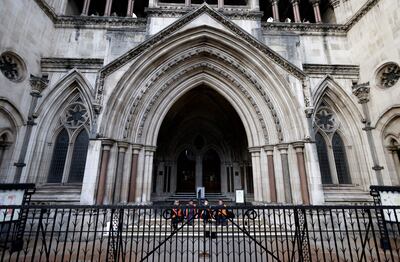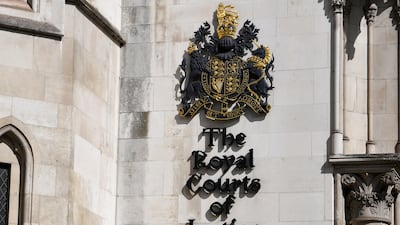An alleged MI5 informant is “dangerous enough to kill a woman” and should be identified publicly “to prevent future harm”, the High Court has heard.
The BBC wants to air a report that would identify the man, referred to as “X” in proceedings, who is alleged to have used his status to “abuse and terrorise” his partner.
The broadcaster said it was in the public interest for his identity to be revealed.
One of the women who alleges she has been abused by him said she feared X would kill a woman if he was not “challenged and exposed”.
The proposed report would claim that X used his status as covert human intelligence source (Chis) to abuse, control and coerce a former partner, referred to by the pseudonym “Beth”, and that MI5 either knew or ought to have known about this.
It would claim that it was wrong to use X as an agent.
Attorney General Suella Braverman is seeking an injunction to block the broadcast, saying that identifying X would create a “real and immediate risk” of serious or life-threatening harm to him and would damage national security.
Mr Justice Chamberlain is considering the case at a two-day hearing in the Royal Courts of Justice in London, which started on Tuesday.
Lawyers representing Ms Braverman said that she “neither confirms nor denies” the BBC’s claim that X is an agent, or covert human intelligence source, but is conducting the hearing on the “hypothetical assumption” that he is or was.
The BBC’s legal team told the court that both Beth and another woman identified as “Ruth”, who do not know each other, have “independently explained their strong and genuine belief that X presents a danger to other women and must be publicly named to prevent future harm”.
Lord David Pannick, representing the broadcaster, said in written arguments: “Beth and Ruth have an intimate insight into X’s psyche and behaviour, making them uniquely placed to evaluate the risk that he poses to other women.”
In a witness statement, Beth said: “I think X is a very dangerous individual – to me, to ex-partners and to other women.
“He thinks it’s OK to treat women the way that he’s treated me. I believe he must be named and identified to the public at large to warn others.”
Ruth said: “I consider that he is dangerous enough to kill a woman and I fear that he will do so if he is not challenged and exposed.
“I think it is crucial that other women know his identity and what he looks like, so that he cannot trick and harm them.”
Mr Pannick told the court: “He told one of those women, who we call Beth, that he worked for MI5 in order to terrorise her, in order to control her.
“The programme will say that MI5 should have known about his behaviours and realised that it was not appropriate to used him as a Chis.”
“The story that the BBC wishes to broadcast is about the link between X’s role as a servant of the state and the abuse of that role in a private context."
He told the court there was a “particularly strong public interest” in the story given the “current context of public debate” on coercive control of women by male partners.
“We do not accept that publication of the story will endanger X himself and we do not accept that it will damage the recruitment or retention of other Chises,” Mr Pannick said.
He said there was “simply no cogent evidence to justify a conclusion that X is at serious risk of serious harm or death” if he was identified.
Mr Pannick said that the special advocates – security-cleared lawyers appointed to represent the BBC in closed proceedings – also made this submission.
In written arguments before the court, Sir James Eadie QC, for the Attorney General, said: “Publication of the report would constitute a breach of confidence/false confidence by the BBC.
“To do so would damage national security and the public interest. It would also create a real and immediate risk of serious or life-threatening harm to X.”

Mr Eadie said there were “avenues for complaint and investigation” in relation to any allegations against MI5, which have been set up “precisely to avoid the sort of damage to the public interest that the BBC’s proposed report would produce”.
He said identifying X as an MI5 agent was “obviously confidential” information.
Mr Eadie also said the “most serious” allegations against X have been investigated by police and no further action was “considered appropriate to be taken”.
“The case of wrongdoing by X, and the subsequent speculation that MI5 must have been aware of it and failed to react appropriately, rests on foundations that are anything but solid," he said.
“There is real doubt about the reliability, credibility and motivation of Beth. Police and the Crown Prosecution Service have been involved but the outcome has been no action, in significant part because of those doubts.”
Ms Braverman said there was no objection to a broadcast about the allegations against X and MI5’s use of agents that did not identify him, but identifying him would be a breach of confidence and infringe X’s human rights.
But Mr Eadie said the BBC had “no interest in producing an anonymous or diluted” version of the report.
Mr Justice Chamberlain told the court earlier on Tuesday that reference to “agent” in the case meant “covert human intelligence source”. He said: “A Chis is not a member of MI5”.
The judge noted there had been “speculation” that the story “was somehow about an officer of the intelligence agencies”.
He said the allegations were “not about such a person”, adding that another word that might be used is “informant”.
Parts of the case are being dealt with in a closed court, for which special advocates represent the BBC’s interests, and other parts of the hearing can be attended by the press and public.
Mr Justice Chamberlain made an order at the outset of the hearing on Tuesday that reporting of the open hearing should be delayed to ensure that nothing is inadvertently revealed in public that should not be.
When the judge gives his ruling on the injunction, there will be an open judgment that will be made public, and a closed judgment that will be seen only by the Attorney General’s legal team and the special advocates.
The hearing will continue on Wednesday but will largely be behind closed doors.


